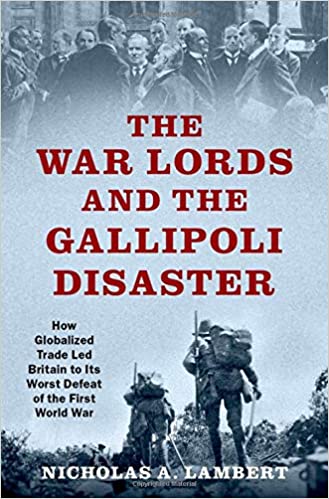
Finest Hour 196
Books, Arts, & Curiosities – What about the Dardanelles?

April 28, 2023
Page 47
Review by Mark Klobas
Mark Klobas teaches history at Scottsdale College and hosts podcasts for the New Books Network.
Nicholas A. Lambert, The War Lords and the Gallipoli Disaster: How Globalized Trade Led Britain to Its Worst Defeat of the First World War, Oxford University Press, 2021, 354 pages, £32.99/$49.95. 978-0197545201
The 1915 Dardanelles operation looms large in nearly every appreciation of Winston Churchill’s political career. In the decades following the disastrous military effort to force the Dardanelles Straits with warships during the First World War, the name was thrown in his face by hecklers at political events and became shorthand for the grandiosity of his pretensions as a military planner. Churchill himself never shied from the association, regarding its failure as one of execution rather than conception. “Don’t imagine that I am running away from the Dardanelles,” he once declared in response to such taunts, “I glory in it.”
Implicit in this long-held understanding of the event is the assumption that Churchill bore sole responsibility for devising the project and selling it to the Cabinet. Nicholas Lambert challenges this assumption in his new book by providing an “intent-based” history of the decision to undertake the operation. He focuses on the debates between the members of the “War Council” subcommittee of the Cabinet—the “War Lords” of Lambert’s title— in the months leading up to the operation’s approval and highlights factors in these deliberations that are often left out of accounts of the final decision to commence the ill-fated campaign.

2024 International Churchill Conference
Lambert begins by summarizing the investigations undertaken by the Dardanelles Commission established in June 1916 to investigate the operation’s failure. The figure of Maurice Hankey looms large in this part of his narrative, since he provided both a secret memorandum and extracts from the informal “minutes” he kept as secretary to the War Council. Together these two sources framed the commission’s understanding of the sub-committee’s decision-making process and shaped the course of their inquiries. While their initial report, delivered in 1917, accepted the Cabinet’s collective responsibility for launching the operation, the commissioners singled out Churchill as the minister who initiated it. Although Churchill objected strongly to the report’s criticisms of the poor planning for the campaign, the rebuttal he offered in his postwar memoirs The World Crisis confirmed his role in winning the War Council’s support, thus placing his justifications for the attack at the center of the subsequent historical debate.
By widening the focus of inquiry to include the other members of the War Cabinet, Lambert finds additional factors beyond Churchill’s own urgings that contributed to the strategic rationale for the campaign. Foremost among these were two interrelated issues, both economic: the growing crisis over wheat prices and the increasing concern over Russia’s finances. These were consequences of the globalized economy of the era.
The revolutions in transportation and communications over the previous century meant that by 1914 Britain was dependent on a global wheat market for grain supplies. While most of this wheat came from North America, Russia was the predominant supplier of wheat to the European continent. Selling wheat abroad was vitally important to the Russian economy because it was a principal source of foreign currency for state finances, particularly for servicing its debt. The outbreak of war in August and the closure of the Dardanelles smashed all of these delicate arrangements, creating two crises that the British and Russian governments scrambled to resolve.
With growing concerns over the rising price of wheat and a looming crisis over Russian demands for financial assistance, the War Council believed that the solution to both problems lay in resuming the flow of wheat through the Dardanelles. Proposals for some form of attack on the peninsula had been advanced even before the Ottoman Empire’s official entry into the war in October 1914. Yet plans to occupy the Dardanelles competed with calls on the limited number of available ground forces being made by Chancellor David Lloyd George’s advocacy of a Balkans deployment and War Secretary Lord Kitchener’s idea of an occupation of Alexandretta. Consequently, Churchill’s offer on 13 January 1915 of an exclusively naval attack sold the War Council on his idea.
Coinciding with an anticipated food crisis over the availability of wheat, the War Council assented on 28 January to what appeared to be a low-risk operation with enormous political-economic rewards. Instead, the British found themselves drawn into a costly campaign with diminishing prospects for success. Ironically the feared wheat shortage was averted not by the sacrifice of the men on the beaches of Gallipoli but by record harvests in the United States and Canada.
To understand the economic and political factors underlying the decision to attack the Dardanelles, Lambert undertakes a far wider reading of the available archival sources than any of his predecessors. By using his sources to provide a more holistic narrative of the decision-making process, he offers a better understanding of how the disaster originated. Although he recognizes that Churchill was a passionate advocate for the operation, Lambert makes it clear that the First Lord of the Admiralty’s fellow Cabinet members needed little persuading to support what seemed an easy solution to an apparently intractable problem. Lambert’s insights make his book necessary reading for anyone interested in the debate over the Dardanelles campaign or in how economics and politics shaped military strategy during the First World War.
Subscribe
WANT MORE?
Get the Churchill Bulletin delivered to your inbox once a month.




